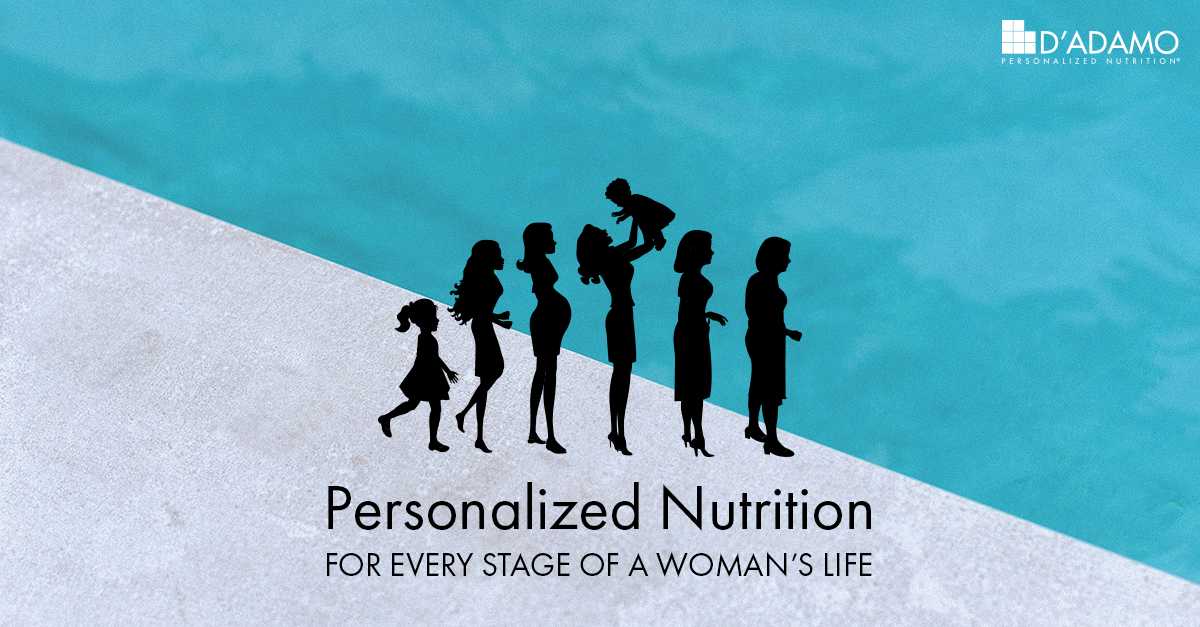
Over the course of her lifetime, a woman’s nutritional needs will change several times. From infancy to adolescence, from motherhood to menopause, change is constant. Good nutritional care is the key to navigating each transformation.
Childhood
Children are notoriously picky eaters, but encouraging good food choices and making sure that kids are getting enough exercise are vital building blocks. It’s important for adults to foster a positive body image in girls early on to create a strong foundation before mixed messages—and often unhealthy ones—come their way during adolescence and beyond.
What’s the best way to do this? Adults in girls’ lives should be good role models. Young girls learn habits for nutritious eating and active living by watching their parents and other adults they look up to.
Girls should be encouraged to:
- Take a multivitamin to help ensure they’re getting all the nutrients they need, including enough calcium for building strong bones
- Take a fish oil blend to help promote healthy brain development
- Engage in a variety of sports to allow for well-balanced muscle, bone and posture development
Teen Years
Today’s teens are reporting unprecedented levels of anxiety and depression. Balancing school, activities, friends and family can be stressful. For girls, there is peer pressure to be thin, and some may try restrictive diets at a time when their bodies are growing rapidly and need good food to supply their developing body.
Learning healthy habits and continuing to cultivate a positive body image are key in navigating these stressors. In addition to continuing to take a calcium supplement featuring vitamin D, exercising right for their type can help teens feel good inside and out.
Blood Types A & AB: Calming, centering exercises are best, such as yoga or tai chi. Not only do they allow for stress relief, but they also strengthen core muscles.
Blood Type B: Physical activity with a mental component—like cycling or tennis—can help occupy a busy mind while offering the benefits of movement. And outside time is always a plus.
Blood Type O: Team sports or martial arts can offer an intense workout to help to calm and bring balance. They are also great for building muscle and developing self-confidence.
Early Adulthood
Busy young women want to be in great shape physically—but they also want to feel healthy and energetic to fully engage in things they enjoy while reducing stress from college or a new career.
Main goals for this phase include:
- Keeping up with regular exercise to keep physically and mentally healthy. As a bonus, it also makes skin glow and boosts energy.
- Working in weight-bearing exercises to build strong bones, tone muscles and manage stress. Regular check-ups are a must at this age—a physical, dental check-up, skin check, and visit to the gynecologist should all be yearly priorities.
Childbearing Years
When it’s time to think about starting a family, all the healthy habits developed and nurtured over the years will help tremendously. To best plan for pregnancy while juggling family responsibilities and continuing career growth, it’s important that a woman:
- Consume the recommended amount of folic acid, as it has been known to help prevent certain birth defects.
- Find time to exercise, even when it’s difficult. Exercise is essential for maintaining bone strength and preserving cardiovascular health.
- Get the recommended allowance of right-for-her-type fruits and vegetables whether cooking for herself or her family. In addition to providing healthy nutrients, they’re also filled with fiber and antioxidants.
- Add a probiotic to her diet to help with digestive problems and irregularity—common during this stage of life.
- Get into the habit of performing monthly breast exams and if approaching 40, getting an annual mammogram.
Menopause
Menopause can cause uncomfortable symptoms for some women, including hot flashes, night sweats, weight gain and moodiness. The good news is that eating right for her type can help keep some of these symptoms in check, or at least manageable. During this stage, it’s important to prioritize:
- Exercising to maintain cardiovascular health, bone strength and flexibility. Many women find yoga and stretching exercises particularly helpful, as they are gentle on the joints and provide the mind-body connection that helps relieve irritability.
- Trying some herbs that have been proven effective in helping to alleviate some of the uncomfortable symptoms of menopause. Chaste tree berry, black cohosh root and dong quai root are among the most frequently prescribed herbs to relieve menopausal symptoms.
- Continuing to see a doctor for an annual physical and routine blood work, and to get annual mammograms—they can be life savers!
- Continuing a supplement regimen of calcium, multivitamins and probiotics.
Seniors
Both physical and mental exercises are important for senior women, as ease of mobility and cognitive function can decrease during these years.
Physical health: Exercises that focus on balance and flexibility are important, as good balance decreases falls and injuries.
Brain health: Since cognitive function may naturally decrease, learning something new—like a second language or a hobby—can challenge an aging mind to stay sharp. Crossword or Sudoku puzzles can also help.
Both: Regular daily activity keeps the heart and muscles strong, while being socially involved through group activity stimulates the mind and elevates mood.
The important thing is not to restrict oneself by letting age become a barometer for potential success. There are a good number of older women who run marathons, climb mountains and engage in competitive sports. The sky’s the limit!
